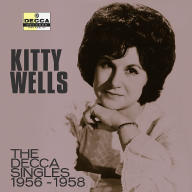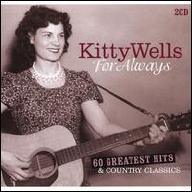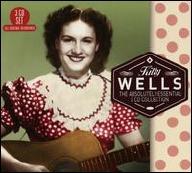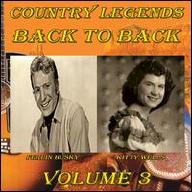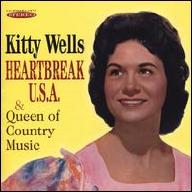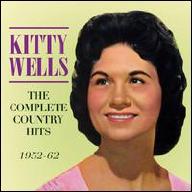Wells began singing as a child, learning guitar from her father. As a teenager, she sang with her sisters, who performed under the name the Deason Sisters, on a local radio station. The group began singing on the station in 1936. The following year, she married Johnnie Wright. Shortly after their marriage, Wells and Wright began performing together along with his sister, Louise Wright; they called themselves Johnnie Wright the Harmony Girls. Jack Anglin, Louise's husband, joined the group in 1939, and they renamed the band the Tennessee Hillbillies, which would eventually evolve into the Tennessee Mountain Boys.
Anglin was drafted into the Army in 1942. Following his departure, Wright and Wells performed as a duo; it was at this time that she adopted the Kitty Wells stage name. When Anglin returned from the Army, he and Wright formed the Johnnie Jack duo. Wells would tour with the duo, occasionally performing backup vocals. In 1946 and 1947, the duo had a regular spot at the Grand Ole Opry, and Wells rarely performed with them. However, she did sing with the pair when they joined the Louisiana Hayride in 1948.
The Louisiana Hayride helped Johnnie Jack land a record contract with RCA Records in 1949. That same year, Wells recorded some gospel tracks -- featuring Johnnie Jack as instrumental support -- for RCA, but they were unsuccessful. Following those recordings, Wells was more or less retired for the next few years. In 1952, Paul Cohen, an executive at Decca Records, approached Wells to record It Wasn't God Who Made Honky Tonk Angels. Wells recorded the song and it became a smash hit, reaching number one in the summer and staying in that position for six weeks. Later in 1952, she joined the Grand Ole Opry.
It Wasn't God Who Made Honky Tonk Angels was followed by Paying for That Back Street Affair, a response to Webb Pierce's Back Street Affair. The single reached number six in the spring of 1953, helping to establish a permanent place at the top of the charts for Wells. For the rest of the '50s, she hit the Top Ten with regularity, racking up a total of 23 Top Ten hits. In the early '60s, her career dipped slightly, but she continued to have Top Ten hits frequently. During the late '60s and '70s, Wells' streak of hits evaporated, but she managed to have a string of minor hits and remained a popular concert attraction.
In 1976, Wells was inducted into the Country Music Hall of Fame, and with good reason. Kitty Wells broke down the doors for female country singers, paving the way for artists like Patsy Cline, Tammy Wynette, and Loretta Lynn. During the '80s, her activity slowed -- in addition to running a museum outside of Nashville, she toured with her husband, Johnnie, and frequently appeared on the Grand Ole Opry. In 1991, she was given a Lifetime Achievement Award from the Grammys. In July 2012 she died at home in Madison, Tennessee, from complications of a stroke; Kitty Wells was 92 years old. ~ Brian Mansfield & Stephen Thomas Erlewine, Rovi


